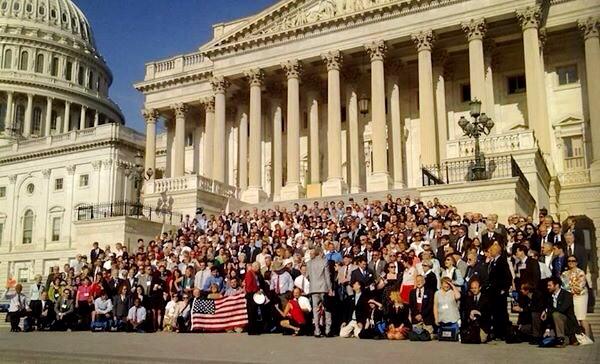My week in late June began by shaking the hand of President Obama. It ended by interviewing First Nations and Métis living in the heart of the Athabasca Tar Sands.
I went from meeting the most sought after person in the world, whose every statement is analysed, to some of the most dismissed people, whose illnesses caused by the tar sands have been downplayed or ignored by government and the media.
My encounter with the President was pure fluke. I was on lunch break during the Citizens’ Climate Lobby’s (CCL) Conference in Washington, D.C. when Obama made an appearance at the restaurant I was at. My interviews in Northern Alberta took place during the fifth and final Tar Sands Healing Walk. We were there to record footage for A Culture of Life, a KAIROS Canada video about Indigenous rights and the need to prioritize the well being of all life over profit at all cost.
It was this cost — the cost of carbon — that brought me to Washington. As incidental as my encounter with Obama was, he did offer encouragement to those of us who told him we were there to lobby Congress for a price on carbon. We want fossil fuel companies to pay for the costs associated with the extraction and burning of fossil fuel — the pollution, illnesses, and global warming — that up until now have been borne on society, such as the people in Northern Alberta.
CCL has been working with Republicans and Democrats for more than five years. Specifically, CCL advocates for a rising fee on carbon at the wellhead to send a market signal for the private and public sectors to invest in clean energy solutions. It also proposes that revenues from the fee be recycled to American households to help them shoulder rising energy costs. This use of the money would make the “tax” revenue neutral, a critical aspect for Republicans who have vowed not to support bills that would raise taxes and increase the size of government.
Revenue neutrality would also be economically simulative. According to a new report by Regional Economic Models Inc. (REMI), a fee on carbon dioxide that increases just $10 per ton each year with revenues returned to households would reduce greenhouse gas emissions by 52 per cent in 20 years while adding 2.8 million jobs to the U.S. economy. Contrary to what some may believe, a revenue neutral carbon tax would be a job creator.
The REMI report proved an invaluable aid in our discussions with U.S. lawmakers. Several Republicans agreed to talk to other Republicans about building support for the CCL proposal. This development was groundbreaking. Another first was CCL’s size at the conference and lobby days. More than 600 citizen volunteers, with 25 from Canada, met with 500 Congressional offices. Momentum is building.
Canadians were lobbying Capitol Hill because any climate action legislated by the Americans would impact our country. Our economies are so integrally linked that Canada would have no choice but to adopt climate measures enacted in the States. And any rising fee on carbon at the point of extraction would impede the growth of the tar sands. For many of the First Nations and Métis living downstream from the open pit mines, this outcome would be welcome news.
The people on the walk who I interviewed spoke of water that they could no longer drink, game and berries they could no longer eat, and medicines they no longer harvest due to the toxins in the watershed, claims confirmed by a recent University of Manitoba study. The interviews were heartfelt and emotional. Some seemed incredulous that people would behave so thoughtlessly to others by poisoning their land and bodies.
My trips to Washington and Fort McMurray reminded me of the severe shortcomings of an economic narrative that prioritizes profits above all else.
Happily, I sense a sea change. More people are demanding action. Tiny breakthroughs and support for effective climate action are building, and the courts are finally starting to rule in favour of Indigenous rights and a new relationship with Indigenous peoples. The landmark Supreme Court decision regarding the Tsilhqot’in First Nation in British Columbia will empower other First Nations to make decisions that affect their land.
This is all good news. We just need to keep pressing for a world where the well being of people and ecosystems trumps profit at all cost.
A Culture of Life will be available at kairoscanada.org in September.
To review short videos of the Tar Sand Healing Walk visit: http://www.kairoscanada.org/sustainability/resource-extraction/tar-sands-healing-walk-videos/
Cheryl McNamara is Media Coordinator at KAIROS Canada, and Toronto Group Leader for the Citizens’ Climate Lobby.
Photo Credits: Citizens’ Climate Lobby and Allan Lissner.



